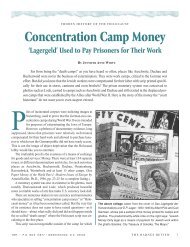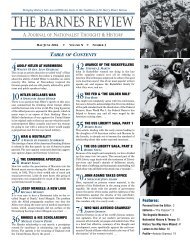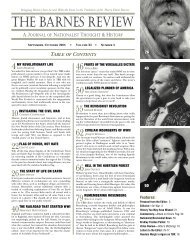You also want an ePaper? Increase the reach of your titles
YUMPU automatically turns print PDFs into web optimized ePapers that Google loves.
Personal from the Editor<br />
In the well-known photo on this page, Albert Einstein pokes<br />
out his tongue. Is he just clowning around, showing what a<br />
funny guy he can be? Or is he showing his contempt for the<br />
public? Was Einstein one of the greatest<br />
con men of all time? For an explosive view<br />
about this possibly overrated “supergenius,”<br />
see our article starting on page 35.<br />
❖ ❖ ❖<br />
Our cover this issue shows Byzantine Em -<br />
peror Heraclius defeating the Persian ruler<br />
Khosrow II, in A.D. 627. Persia had tempor -<br />
arily conquered Jerusalem, only to see it<br />
taken back by the Byzantines. Soon a rising<br />
Islam would take the holy city for itself. <strong>The</strong><br />
reign of another Byzantine emperor, Justin -<br />
ian, was marked by some of the greatest military<br />
achievements of all time, under the generals<br />
Belisarius and Narses: reconquering the<br />
key ex-Roman states of Italy, Spain and North<br />
Africa. <strong>The</strong> most im portant and respected<br />
source for this period is Procopius of Caes -<br />
area. Procopius accompanied Belisarius on some of his great conquests<br />
and wrote some official histories of the wars and of Jus -<br />
tinian’s immense building programs. He ensured that we re -<br />
member Justinian as a political and military genius. That was<br />
true, as far as it went. But Procopius dared not publicly say what<br />
was really going on in the personal lives of Justinian and his wife<br />
and others of his inner circle. He feared for his life if he did. So<br />
he wrote another, secret history, with strict instructions that it<br />
was not to be published until after his death. This history was so<br />
shocking that many scholars have wanted to believe it a forgery.<br />
Yet its pedigree, and every test that can be made on it, show it is<br />
bona fide. For more on the little-remembered history of this key<br />
part of the medieval world, see our symposium of articles—the<br />
one by Edward May starting on page 5 of this issue and the related<br />
two articles following it.<br />
❖ ❖ ❖<br />
<strong>The</strong> slave trade in Africa (pp. 23 ff.) has been often misused by<br />
political factions pursuing their own agendas. Books by what<br />
Harry Elmer <strong>Barnes</strong> would call the “court historians” at tempt to<br />
paint a picture of a “Merrie Old Africa.” School children are<br />
taught that sub-Saharan Africa was like a Garden of Eden before<br />
the advent of the “evil white devils,” who oppressed the blacks in<br />
their native land, and carried some of them away to a life of horrible<br />
servitude. But this establishment history of Africa and of<br />
the slave trade associated with the Dark Continent is completely<br />
false, as it is nothing more than propaganda aimed at defaming<br />
an entire race of people (whites) for a tragic situation not<br />
entirely of their own making. Even though the European powers<br />
failed to induce the Africans to learn civilized conduct, as is<br />
noticeable to this day in the way black Africans and Afro-Ameri -<br />
cans still treat one another (not to mention they way they treat<br />
white people and Asiatics), the goal of the European powers was<br />
a lofty one none theless.<br />
<strong>The</strong> real history of slavery in Africa is a history of native<br />
power and greed.<br />
Even before the arrival of Europeans, the African tribal kings<br />
and tribal elites not only commanded the respect and tribute of<br />
their subjects, but also abused this respect to aggrandize them-<br />
selves and to increase their own power. Over a period of more<br />
than 400 years, black Africans enslaved about 21 million of their<br />
own people. Of these, nearly 12 million died within their first<br />
year of slavery in Africa, mainly as a result of poor<br />
food and little water, or as a result of being sacrificed,<br />
tortured to death for entertainment and/or<br />
being eaten.<br />
It should be noted that it was not the Africans<br />
who ended the transatlantic slave trade, but rather<br />
the Europeans and Americans. If it had not been for<br />
the heroic mission of the white powers in Africa, life<br />
there would no doubt be much harsher than it is<br />
today. In Africa itself, despite the efforts of the former<br />
colonial powers, chattel slavery has continued<br />
down to the present. Overall, the history of African<br />
slavery should be understood as a crime Africans<br />
perpetrated against one another; and the liberalinspired<br />
tirades against “white devils” should end.<br />
And there’s lots more great Revisionist material<br />
for you to digest, so turn off the television, settle<br />
yourself in your favorite easy chair, and enjoy the<br />
fascinating material contained within the pages of this issue of<br />
THE BARNES REVIEW. ❖<br />
the <strong>Barnes</strong> review<br />
Publisher: W. A. CARTO<br />
Editor: JOHN TIFFANY<br />
Associate Editor: M. RAPHAEL JOHNSON<br />
Contributing Editor: FRED BLAHUT<br />
Contributing Editor: DANIEL MICHAELS<br />
Copy Editor: ANDREW GRAY<br />
Production Director: PAUL T. ANGEL<br />
THE BARNES REVIEW (ISSN 1078-4799) is published bimonthly by TBR Co.,<br />
130 Third Street SE, Washington, D.C. 20003. Periodical rate postage paid at<br />
Wash ington, D.C. and additional mailing offices. For credit card orders including<br />
subscriptions, call toll-free 1-877-773-9077 and use Visa or MasterCard.<br />
Other inquiries cannot be handled through the toll free number. For changes<br />
of address please call 909-587-6936. All editorial, business or bulk distribution<br />
inquiries please call 202-546-1586. All rights reserved except that copies or<br />
reprints may be made without permission so long as THE BARNES REVIEW is<br />
given proper credit and no changes are made. All manuscripts submitted must<br />
be typewritten and doublespaced. No responsibility can be assumed for unreturned<br />
manuscripts. Change of address: Send your old, incorrect mailing label<br />
and your new, correct address neatly printed or typed 30 days before you move<br />
to assure delivery. Advertising: MEDIA PLACEMENT SERVICE, Sharon DeWitt,<br />
301-722-1948 or fax 301-722-2810. Website: www.barnesreview.org. Email:<br />
barnesrev@hotmail.com.<br />
POSTMASTER: Send address changes to THE BARNES REVIEW,<br />
130 Third Street, SE, Washington, D.C. 20003.<br />
SUBSCRIPTION RATES (ALL ISSUES MAILED IN CLOSED ENVELOPE)<br />
U.S.A.<br />
Periodical Rate: 1 year, $46 2 years, $78 3 years, $87<br />
First Class: 1 year, $70 2 years, $124 3 years, $144<br />
Foreign Countries: All payments must be in U.S. dollars.<br />
Regular Surface:<br />
1 year, $58 2 years, $102<br />
Foreign Airmail: 1 year 2 years<br />
Canada and Mexico $72 $130<br />
Western Hemisphere $80 $144<br />
Europe $88 $161<br />
Asia and Africa $95 $176<br />
Pacific Rim $96 $178<br />
Quantity Prices 1-3 $12 each<br />
(Current issue U.S.A.): 4-7 $11 each<br />
8-19 $10 each<br />
20 and more $9 each
















